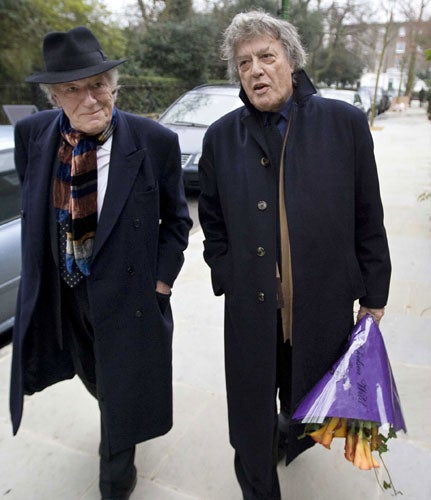Pinter's perfectly scripted farewell

For a deeply private man it was a brief and intensely private funeral. But, even in death, Harold Pinter made sure his final farewell was as carefully and poetically orchestrated as his life's work with readings from one of his own plays and a poem about his favourite sport, cricket.
Friends, relatives and loved ones gathered to say goodbye to the lauded British playwright and polemicist in a quiet corner of Kensal Green Cemetery after his death on Christmas Eve from cancer.
About 50 guests, including his wife Lady Antonia Fraser and fellow playwright Tom Stoppard, turned up for the 15-minute ceremony which had been carefully planned by Pinter shortly before he died, aged 78. As a committed atheist, prayers were replaced by two secular readings, one an extract from his 1975 play No Man's Land and the other a 19th-century poem about one of his greatest loves: cricket – a sport he once described as being "greater than sex".
The actor Sir Michael Gambon, currently starring in No Man's Land at the Duke of York Theatre, was asked by the playwright three months ago over dinner in Dublin to read out a passage from the play, a dark tragicomedy about two ageing writers who meet as strangers on Hampstead Heath before drinking and reminiscing their way through the night.
Under grey skies in north London Sir Michael read: "You might even see a face in it that might remind you of your own, of what you once were. You might see faces of others in shadows or cheeks of others turning or jaws or backs of necks or eyes, dark under hats, which might remind you of others whom you thought long dead but from whom you will still receive a side-long glance if you can face the good ghost."
When Sir Michael spoke the same lines on Boxing Day during the first production of the Pinter play after the writer's his death, there was barely a dry eye in the audience.
Matthew "Harry" Burton, a friend of Pinter's who was a regular in his Gaieties Cricket Club, also read the poem At Lord's by the English poet and ascetic Francis Thompson who, like Pinter, found endless solace in a calm game of cricket on a balmy summer's day.
That Pinter's funeral had a decidedly cricketing theme to it is perhaps no surprise. In his final newspaper interview, given in October and published shortly after his death, he explained how, as a child in the pre-war years, he would wander down to fields that lay next to the River Lea, close to his Hackney home, to play cricket with his childhood friends – many of whom, he said, he was still in contact with.
"I used to get up at five in the morning and play cricket," he said. "We walked down to the fields; there'd be nobody about – it would really very early in the morning, and there would be a tree we used as a wicket. We would take it in turns to bat and bowl; we would be Lindwall, Miller, Hutton and Compton. That was the life."
For much of the past thirty years, Pinter captained and later became chairman of the Gaieties Cricket Club, a wandering cricket team that played in the Home Counties and was made up largely, though not exclusively, of fellow theatrical folk and literati friends.
It was founded in 1937 by the music hall artist Lupino Lane, whose company was at that time based at the Gaiety Theatre, in London.
At the end of every cricket season Pinter would read his teammates Thompson's poem. In later years, his love of cricket was somewhat overshadowed by his political activism, in particular his acerbic attacks on US foreign policy.
His passing shortly before Christmas after many years of suffering from various forms of cancer left the literary world minus one of its most prolific and respected writers. As a mark of respect, theatres across Broadway on Tuesday night dimmed their lights for one minute during their evening productions. A memorial service which will be open to the public is being planned for the near future.
'Allow the love of the good ghost'
Reading by Michael Gambon, taken from Pinter's 'No Man's Land'
"I might even show you my photograph album. You might even see a face in it that might remind you of your own of what you once were. You might see faces of others in shadow or cheeks of others turning or jaws or backs of necks or eyes, dark under hat, which might remind you of others whom you once knew, whom you thought long dead but from whom you will still receive a sidelong glance if you can face the good ghost. Allow the love of the good ghost. They possess all that emotion trapped. Bow to it. It will assuredly never release them but who knows what relief it may give to them.
At Lords, a poem by Francis Thompson (1859-1907) read by Matthew "Harry" Burton, a friend of Pinter's
It is little I repair to the matches of the Southron folk,
Though my own red roses there may blow;
It is little I repair to the matches of the Southron folk,
Though the red roses crest the caps, I know.
For the field is full of shades as I near a shadowy coast,
And a ghostly batsman plays to the bowling of a ghost,
And I look through my tears on a soundless-clapping host
As the run stealers flicker
to and fro, To and fro."
Subscribe to Independent Premium to bookmark this article
Want to bookmark your favourite articles and stories to read or reference later? Start your Independent Premium subscription today.

Join our commenting forum
Join thought-provoking conversations, follow other Independent readers and see their replies